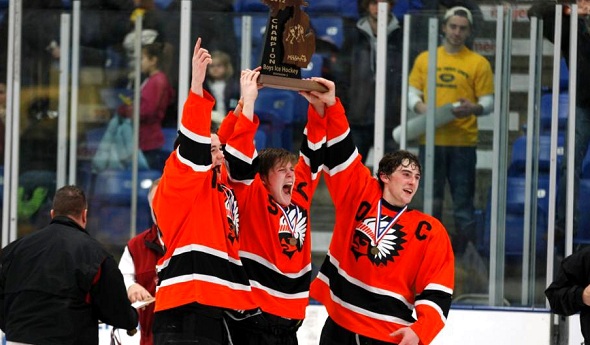
Division 2: This time, it's Brother Rice
March 10, 2012
PLYMOUTH – Mackenzie MacEachern and Thomas Ebbing have known each other since they were 2 or 3. They’ve played hockey on the same teams for five years.
And there was no way they were going to end their final high school game together for Bloomfield Hills Brother Rice with another Division 2 Final loss.
Saturday’s 4-1 championship game win over Grosse Pointe South at Compuware Arena landed the Warriors their first MHSAA title since 2005. And it took root exactly one year ago, when Brother Rice fell to Wyandotte Roosevelt in the Division 2 Final by the same score.
“We weren’t about to face that again this year,” Ebbing said. “So we came out strong, and we won. And that’s all that matters.”
Ranked No. 1 entering the postseason, Brother Rice finished 25-4-1. Two of those wins came over Wyandotte Roosevelt. And all four of those losses came to opponents from the Michigan Interscholastic Hockey League, without question the most competitive in the state featuring many of the top-ranked teams in all three MHSAA divisions – and four of eight Division 1 and 2 Semifinalists this weekend.
The Warriors finished MIHL runner-up to Division 1 Detroit Catholic Central and along the way picked up the patience, puck possession skills and defensive tenacity that paid off through a six-game tournament run during which they outscored opponents 36-5.
“There weren’t a lot of guys in that locker room who remembered last year, but there were five,” said Brother Rice coach Lou Schmidt, Jr., referring in part to captains Ebbing, MacEachern and senior Chris Wilberding. “They said it wasn’t going to happen again.”
 Senior Eric Dibble got Brother Rice on the board 1 minute, 50 seconds in off a pass from junior T.J. Petzold. But Grosse Pointe South (22-6-1) evened the score with a power play goal by junior Jake Cordon with 26 seconds remaining in the first period.
Senior Eric Dibble got Brother Rice on the board 1 minute, 50 seconds in off a pass from junior T.J. Petzold. But Grosse Pointe South (22-6-1) evened the score with a power play goal by junior Jake Cordon with 26 seconds remaining in the first period.
“To have an ever score after the first period was great," Grosse Pointe South coach James Bufalino said. "But we wouldn’t say there was any five minutes where we outplayed them tonight. We lost to a great team."
The Warriors outshot Grosse Pointe South 16-2 in the second period, with junior Russell Cicerone and MacEachern both scoring. Cicerone added another goal with 15 seconds to play.
Total, Brother Rice outshot Grosse Pointe South 38-17. Blue Devils senior Christopher Schebil had 34 saves, including 27 over the first two periods.
"We played a lot of great teams like Trenton and (Grosse Pointe) North," Schebil said. "It seemed like every single one of (Rice's players) was fast, like every single one of them had a fast shot, so it was tough. The shots were coming from everywhere."
MacEachern, a senior who has committed to join Michigan State after a year or two of juniors, finished arguably the best offensive run in the state this season with 42 goals and 48 assists. Ebbing, a junior, added 27 goals and 40 assists.
“We’ve always told the guys, we just want you to continue doing what you’re doing, but do it at a faster level, a higher level,” Schmidt said. “Every practice this year, that’s what we did. We continued working on foot speed, continued working on individual skills so that they were passing the puck into the offensive zone instead of just getting rid of it. In that regard, they got better every game as the season progressed, and we’ve never lost our focus.”
Click for the Division 2 Final box score.
PHOTOS courtesy of Hockey Weekly.
(Top) Brother Rice captains Mackenzie MacEachern (left), Chris Wilberding (center) and Thomas Ebbing hoist the championship trophy after Saturday's win.
(Middle) MacEachern (19) splits Grosse Pointe South defenders Saturday. He scored his 42nd goal of the season in the Final.
State Champs! Network: 2023 Ice Hockey Finals Highlights
March 29, 2023
Join Jonathon Kidd and Sean Baligian as we take a look at all of the action from the 2023 Hockey State Finals
Congratulations to our State Champions
Division 1 - Detroit Catholic Central
Division 2 - Brother Rice
Division 3 - Flint Powers

